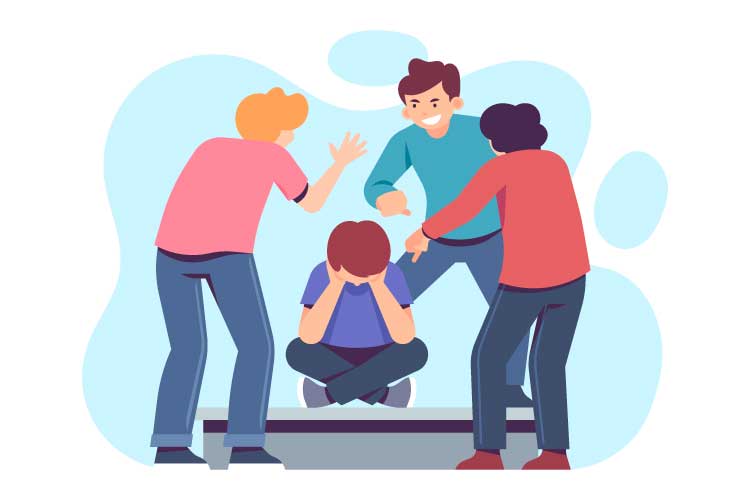What drives bullying?
Bullying is a common occurrence that often takes place in schools. What usually happens is that bullies slander people, threaten them, make up stories about them, and disseminate untrue tales about them. They frequently target less-liked individuals who do not attempt to protect themselves. A person could become a bully for a variety of reasons, some of which might include:
- A person may become a bully if they feel helpless and weak. Bullying victims may become bullies themselves to feel more powerful.
- Bullying a student, particularly an unpopular one, may increase their popularity or, in a professional setting, may prevent other employees from making decisions.
- Bullying is frequently a learned behavior. Children who have seen their parents resort to bullying techniques to acquire what they want may not know any other options.
- Another highly prevalent motive for bullying is envy. People frequently experience jealousy when someone around them is significantly brighter or more productive than them, which may easily result in bullying.
- People with narcissistic personalities and a lack of empathy may unintentionally bully others, especially those who are less well-liked, have worse academic standings, or have lower position ranks at work (Nittle, 2021).
Impacts of bullying
According to research, the majority of the time, bullying victims only experience temporary impacts. Anxiety, sadness, and even suicidal thoughts have been reported in certain cases to have substantial long-term repercussions that persist into adulthood (Duplá, 2021).
The mild effects of bullying might include giving up on hobbies they formerly found enjoyable, developing trust difficulties or mental health problems, experiencing loneliness and isolation, changing one’s eating and sleeping habits, and engaging in alcohol and tobacco use. It’s crucial to get expert assistance since there are some situations where victims of intense bullying resort to violent acts, including stabbing or shooting. Last but not least, those who have a history of bullying are more likely to maltreat their kids (Nittle, 2021).
How to handle school bullying
- Simulating likely situations and thinking of the best ways to respond or what actions will be the way out could be a big help if that situation becomes true.
- Confidence is essential for surviving bullying, since someone without it is the number one target for bullies. Believing in their self-worth makes it much easier to shrug off the insults and threats thrown at them. Also, someone with abnormal levels of confidence and self-assurance might even laugh at insults and then walk away. Confidence can also make a person not care about humiliation or offenses they get from bullying.
- Telling an adult or a teacher of what happened is easily one of the best ways to handle bullying, but many teenagers are afraid to do so because they fear what the bullies might do to them for getting them into trouble (Colino and Broadwelll, 2023).
- Bullies may become hesitant if they are always in groups of more than two. Telling the bully to stand up and declare that their actions are wrong can typically reduce bullying since there are usually other people who are also being bullied by them.
- Responding without anger or emotion is very important when dealing with verbal bullying. Calming, ask honest questions such as, “It seems that you dislike me; why do you feel that way? “It might not seem that effective, but bullies do not often have actual reasons, so these kinds of questions make them secretly intimate (Gibson, 2023).
Conclusion
Bullying may be challenging to deal with, particularly if the victims have a history of temper tantrums. Bullying may be readily stopped by politely confronting the perpetrators directly or by enlisting the aid of friends. If you have that type of personality, being loyal to one’s views and resisting intimidation or humiliation will be quite helpful. Finally, developing a level of familiarity with a large number of individuals can help you get more supporters and has a high likelihood of putting an end to untrue stories.
References
Colino, S. and Broadwelll, L. (2023). Bully-Proof Your Child: How to Deal With Bullies. [online] Parents. Available at: https://www.parents.com/kids/problems/bullying/bully-proof-your-child-how-to-deal-with-bullies/ [Accessed 4 September 2023].
Duplá, T. (2021). The psychology behind bullying: how to detect it | Esade – Do Better. [online] dobetter.esade.edu. Available at: https://dobetter.esade.edu/en/psychology-bullying [Accessed 4 September 2023].
Gibson, C. (2023). Stop Being Bullied. [online] wikiHow. Available at: https://www.wikihow.com/Stop-Being-Bullied [Accessed 4 September. 2023].
Nittle, N. (2021). Why Do People Bully? [online] Verywell Mind. Available at: https://www.verywellmind.com/why-do-people-bully-5187244 [Accessed 4 September 2023].
